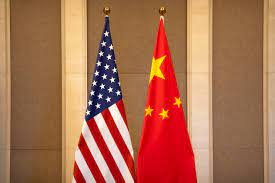The Biden administration is intensifying its regulations on the export of certain semiconductors to China, citing the need to close existing regulatory loopholes introduced last year.
On Tuesday, the US Commerce Department unveiled new rules aimed at bolstering a comprehensive set of export controls first introduced in October 2022.
These updated regulations, according to US Commerce Secretary Gina Raimondo, “will increase the effectiveness of our controls and further close off avenues to circumvent our restrictions.”

She added that these measures were aimed at protecting national security by restricting access to critical technologies while minimizing any unintended trade impacts.
The new rules will affect advanced artificial intelligence chips, such as Nvidia’s H800 and A800 products, as stated in a regulatory filing by the US company.
Furthermore, these measures will expand export restrictions beyond mainland China and Macao to include 21 other countries with which the United States maintains an arms embargo, including Iran and Russia.
The revised regulations, set to take effect in 30 days, have already impacted the share prices of major American chipmakers.
The original rules were designed to impede China’s ability to acquire advanced computing chips and produce advanced weapons systems, but subsequent technological advancements have prompted a need for adjustments.
Commerce Secretary Raimondo, who visited China in August, emphasized that the administration is focused on slowing China’s military advancement.
She also clarified that the new rules do not place additional restrictions on chips used in phones, video games, and electric vehicles.

These measures have raised concerns in Beijing, where they have been criticized by China’s Foreign Ministry.
The ministry called on the US to stop politicizing trade and technology issues and to cease destabilizing global industrial and supply chains.
This escalation in the tech rivalry between the two largest economies in the world has been evident in recent months.
The United States has enlisted its allies in Europe and Asia to restrict the sale of advanced chipmaking equipment to China, prompting retaliatory measures by Beijing.
US chipmakers, including Nvidia, Intel, and AMD, saw their shares decline following the announcement of the new export controls. Nvidia’s stock fell by 4.7%, Intel slipped 1.4%, and AMD shares ended 1.2% lower.
In response, Nvidia revealed that the rules imposed new licensing requirements for exports to China and other markets, including Saudi Arabia, the United Arab Emirates, and Vietnam.
The company indicated that its A800 chip, reportedly developed for Chinese customers to circumvent last year’s restrictions, would be among the affected components.
However, Nvidia believes that these additional restrictions will not have a significant near-term impact on its financial results due to strong global demand for its products.
The Semiconductor Industry Association, representing 99% of the US chip sector, expressed concerns about the potential impact of the new rules on the US semiconductor ecosystem.
The association stressed the importance of coordinating with allies to ensure a level playing field for all companies.
These measures are also being reviewed in Europe, with ASML, a Dutch chipmaking equipment manufacturer, evaluating their implications.
While ASML does not expect a significant impact on its 2023 financial outlook, its CEO stated that the updated export restrictions would affect between 10% and 15% of the firm’s sales to China.

In addition to the export control changes, the US Department of Commerce added 13 Chinese entities to its list of firms with which US companies may not do business for national security reasons.
Among them are two Chinese startups, Biren Technology and Moore Thread Intelligent Technology, and their subsidiaries, alleged to be involved in activities contrary to US national security due to their development of advanced computing chips.

